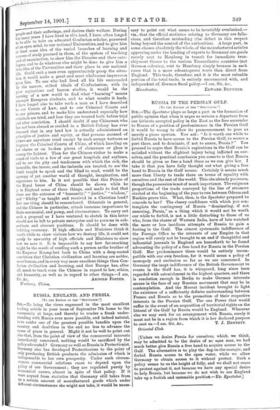RUSSIA IN THE PERSIAN GULF.
pro THE EDITOR OF TEE " SPECTATOR:1 SID,—The Spectator plays so large a part in the formation of public opinion that when it urges so serious a departure from our hitherto accepted policy in the East as the free surrender to Russia of a position of predominance in the Persian Gulf it would be wrong to allow its pronouncement to pass as merely a pious opinion. You ask: "Is it worth our while to forbid Russia to have access to the Persian Gulf, to secure a port there, and to dominate, if not to annex, Persia ? " You proceed to argue that Russia's aspirations in the Gulf can be satisfied without the slightest injury being inflicted on our- selves, and the practical conclusion you come to is that Russia should be given as free a hand there as we can give her. I take it that you have fully thought out what giving a free hand to Russia in the Gulf means. Certainly it means much more than liberty to trade there on terms of equality with ourselves and the rest of the world. This she already possesses, though the possession is not of much importance. The exiguous proportions of the trade conveyed by the line of steamers started at the beginning of the year to run between Odessa and Bushire prove this. What, then, is the Spectator prepared to concede to her? The cheery confidence with which you con- template the contingency of Russia "dominating,' if not annexing, Persia," as a. thing which it would not be worth our while to forbid, is not a little disturbing to those of us who, from the shores of Western India, have of late watched the more or less insidious attempts of Russia to gain a footing in the Gulf. The almost systematic indifference of the Foreign Office to the interests of our Empire in that region will surely not be brought to an end if thoughtful and influential journals in England are henceforth to be found advocating the policy of a free hand for Russia in the Persian Gulf. Her predominance there would be entirely incom- patible with our own freedom, for it would mean a policy of monopoly and exclusion so far as we are concerned: In Germany the inept indifference of the British Government to events in the Gulf has, it is whispered, long since been regarded with astonishment in the highest quarters, and there is resolution enough in Berlin to make German interests secure in the face of any Russian movement that may be in contemplation. And the Muscat incident brought to light the existence of a sufficiently definite understanding between France and Russia as to the promotion of their respective interests in the Persian Gulf. The one Power that would suffer in the event of an acquisition of territorial rights on the littoral of the Gulf by Russia would be England. Wherever else we may seek for an arrangement with Russia, surely it must not be in a region from which it is her declared purpose [Unless we desire Persia for ourselves, which, we think, may be admitted to be the desire of no sane man, we had much better give Russia a free hand to acquire access to the Gulf. The alternative is to play the dog-in-the-manger, and forbid Russia access to the open water, while we allow Germany to obtain access to it without protest. Such a policy seems to us the height of folly, and we shall not cease to protest against it, not because we have any special desire to help Russia, but because we do not wish to see England take up a foolish and untenable position.—ED. Spectator.)






































 Previous page
Previous page